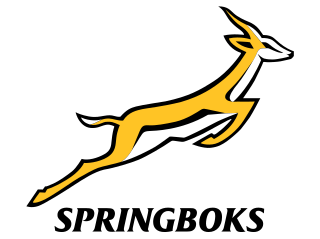
The South Africa national rugby union team, commonly known as the Springboks, is the country's national team governed by the South African Rugby Union. The Springboks play in green and gold jerseys with white shorts, and their emblem is the Springbok, a native antelope and the national animal of South Africa. The team has represented South African Rugby Union in international rugby union since 30 July 1891, when they played their first test match against a British Isles touring team. Currently, the Springboks are the reigning World Champions, having won the World Cup a record four times. South Africa are the only team to have won half of the Rugby World Cups they have participated in, and are also the second nation to win the World Cup consecutively.

The 1995 Rugby World Cup, was the third Rugby World Cup. It was hosted and won by South Africa, and was the first Rugby World Cup in which every match was held in one country.
Joel Theodore Stransky is a South African former rugby union player. A fly-half, he is known for scoring all of South Africa's points, including the winning drop goal, against New Zealand in the 1995 Rugby World Cup final.
The 1997 British Lions tour to South Africa was a series of matches played by the British Lions rugby union team in South Africa. This tour followed the Lions' 1993 tour to New Zealand and preceded their 2001 tour to Australia. The much-anticipated tour was the first after the end of apartheid in South Africa, and the first Lions tour since rugby union turned professional. It was only the third time that a touring side had won a test series in South Africa; the others being the 1974 Lions and the 1996 All Blacks.

Andrew Philip Mehrtens is a New Zealand former rugby union player. He was regarded as a top first five-eighth, having played first for Canterbury in 1993, before being selected for the All Blacks in 1995 when he played in the 1995 World Cup.
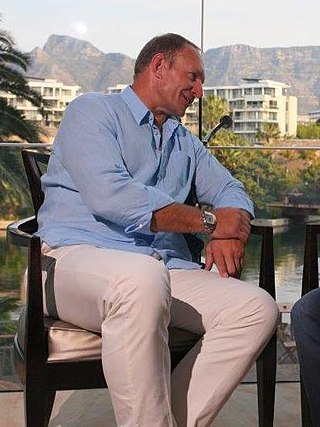
Jacobus Francois Pienaar is a retired South African rugby union player. He played flanker for South Africa from 1993 until 1996, winning 29 international caps, all of them as captain. He is best known for leading South Africa to victory in the 1995 Rugby World Cup. After being dropped from the Springbok team in 1996, Pienaar went on to a career with English club Saracens.
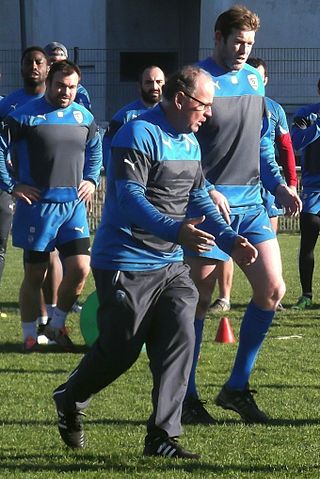
Jacob Charles White is a professional rugby union coach and former coach of the South African national team – the Springboks – whom he coached to victory in 2007 Rugby World Cup and the 2004 Tri Nations. White also coached the Under-21 Springbok side to victory in the Under-21 World Cup in 2002. He was coach of the Brumbies in the Super Rugby from 2012, but resigned with two years remaining on his contract in 2013 to return to South Africa. On returning to South Africa, he coached the Sharks for a single season, explaining he wanted to seek international opportunities. This arose in a technical role with the Tongan national team. After assisting Tonga in their 3 Test European Tour in 2014, White was announced as Montpellier's new boss, overseeing all coaching aspects for the club.
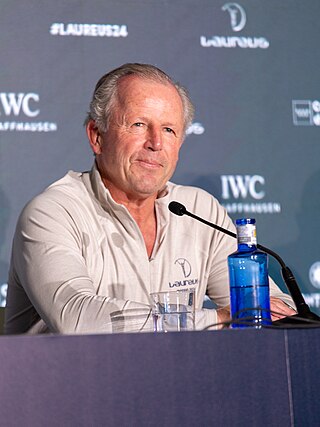
Sean Brian Thomas Fitzpatrick is a New Zealand former rugby union player.
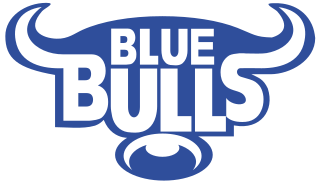
The Blue Bulls is a South African rugby union team that participates in the annual Currie Cup tournament and the United Rugby Championship. They are governed by the Blue Bulls Rugby Union and are based at Loftus Versfeld Stadium in Pretoria, Gauteng province.
The first Rugby Union World Cup was held in 1987, hosted by Australia and New Zealand who pushed for the tournament to be approved. Since the first tournament, 9 others have been held at four-year intervals.
George Moir Christie, better known as Kitch Christie, was a South African rugby union coach best known for coaching the country's national team, the Springboks, to victory at the 1995 Rugby World Cup. He remained unbeaten during his tenure as Springbok rugby coach between 1994 and 1996, including leading the team to a then record 14 consecutive victories. In 2011, he was inducted posthumously into the IRB Hall of Fame, later subsumed into the World Rugby Hall of Fame.

The 2007 Rugby World Cup final was a rugby union match, played on Saturday, 20 October 2007 at the Stade de France, Saint-Denis, Paris, to determine the winner of the 2007 Rugby World Cup. South Africa beat England 15–6. Having also won the 1995 tournament, South Africa became the second country to win two World Cups, following Australia, who won in 1991 and 1999.
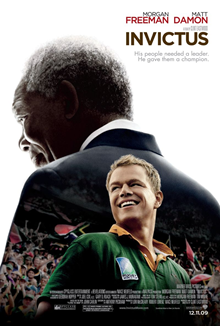
Invictus is a 2009 biographical sports film directed by Clint Eastwood and starring Morgan Freeman and Matt Damon, making it the third collaboration between Eastwood and Freeman after Unforgiven (1992) and Million Dollar Baby (2004). The story is based on the 2008 John Carlin book Playing the Enemy: Nelson Mandela and the Game That Made a Nation about the events in South Africa before and during the 1995 Rugby World Cup. The Springboks were not expected to perform well, the team having only recently returned to high-level international competition following the dismantling of apartheid—the country was hosting the World Cup, thus earning an automatic entry. Freeman portrays South African President Nelson Mandela while Damon played Francois Pienaar, the captain of the Springboks, the South Africa rugby union team.

Morné Steyn, is a South African former professional rugby union player who played as a fly-half for the Bulls and played for the South Africa national team, up until his retirement from international test rugby in October 2021.

Handré Pollard is a South African professional rugby union player who currently plays for the South Africa national team and Leicester Tigers in England's Premiership Rugby. His regular playing positions are fly-half, where he started for South Africa in their 2019 Rugby World Cup Final win, and inside-centre. He has previously played for the Bulls and Blue Bulls in his native South Africa, Osaka Red Hurricanes in Japan and Montpellier in France. He is one of 43 players who have won the Rugby World Cup on multiple occasions, 24 of whom are South Africans.

Rugby union and apartheid had a complex and supportive relationship. From 1948 to 1994, international rugby relations with the country, and also the non-integrated nature of rugby within South Africa drew frequent controversy. South Africa remained a member of the International Rugby Board (IRB) throughout the apartheid era.
The History of the South Africa national rugby union team dates back to 1891, when the British Lions first toured South Africa where they played against South African representative sides. The South Africa national rugby union team played few international matches during a period of international sanctions due to apartheid. Since the end of apartheid in 1994, South Africa has once again fully participated in international rugby.

In 1992, the South Africa Springboks played a rugby union test match against the New Zealand All Blacks, which later became known as the Return Test. The match was played at Ellis Park Stadium in Johannesburg on 15 August 1992. It was named as the Return Test as it was South Africa's first test match since the International Rugby Football Board (IRFB) had banned them due to apartheid.













